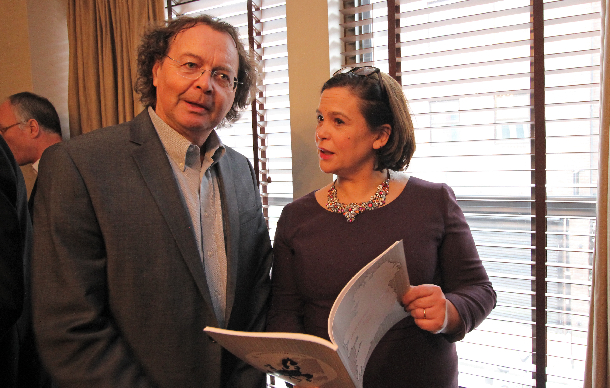22 March 2016
United Ireland economically beneficial to North and South, says international expert study launched in Dublin

Dr Kurt Hubner speaks to Mary Lou McDonald TD at the Westbury Hotel
SIGNIFICANT long-term improvement in the economies of both the North of Ireland and the South would result from unification, a major international economic study has found.
Launched in Dublin on Tuesday (and in Belfast on Wednesday), the study – entitled Modelling Irish Unification – was carried out by political science and economics researchers who had carried out similar examinations of German and Korean unification models.
The report presents the first comprehensive economic models simulating the political and economic integration of the two states in Ireland.
Three unification scenarios were presented, with the most aggressive estimating a €35.6billion boost in an all-island GDP in the first eight years of unification.
It found that there would be long-term improvement in the Northern Irish economy as a result of the removal of currency, trade and tax barriers which currently impede economic growth. At the same time, the South would benefit from barrier-free access to the Northern Irish market.
By modelling three separate unification scenarios, the researchers showed a long-term improvement of GDP per capita in the North of 4% to 7.5% while the South would see a boost of 0.7% to 1.2%.
The study is particularly timely given current debates over Irish economic growth and Westminster's continued participation in the European Union.
The research was led by Dr Kurt Hubner (Professor of Political Science), Jean Monnet (Chair for European Integration and Global Political Economy and Director of the Institute for European Studies at the University of British Columbia in Canada). Dr Hubner directed the research through his firm KLC – Consulting for Tomorrow, an economic and political relations consulting firm based in Vancouver.
The economic model was developed by Dr Renger Herman van Nieuwkoop, Director and Founder of ModelWorks and Professor of Economics at ETH Zurich, Switzerland.
“Our modelling exercise points to strong positive unification effects driven by successful currency devaluation and a policy-dependent industrial turnaround," said Dr Hubner.
“While these effects occur in a static global economic environment, under ideal political conditions they underline the potential of political and economic unification when it is supported by smart economic policy.”
In the executive summary, Professor Steven Raphael of the University of California at Berkeley writes:
“Political and economic unification of the North and South would likely result in a sizeable boost in economic output and incomes in the North and a smaller boost in the [South of Ireland].”
Marcus Noland, Executive Vice-President and Director of Studies at the Peterson Institute for International Economics in Washington, provided comment on the study, writing:
“Modelling Irish Unification is an important, timely examination of the economics of Irish unification, applying state-of-the-art modelling techniques to the issue at hand. The modelling work illustrates a variety of channels which are likely to be at play in the Irish case and concludes that Irish unification would be economically beneficial to both parts of the island, especially for smaller, poorer, Northern Ireland.”
Michael Burke, economic consultant and former Senior International Economist at Citibank in London, discussed the global impact of a unified Ireland, saying:
“The issue of the benefits of a unified Irish economy are unfortunately largely overlooked. This paper goes some way to correcting that and will help develop discussion in this neglected area.”
The study was commissioned by KRB, a San Francisco Bay area–based non-profit social welfare organisation that promotes social welfare and conflict resolution through education.
Follow us on Facebook
An Phoblacht on Twitter
Uncomfortable Conversations

An initiative for dialogue
for reconciliation
— — — — — — —
Contributions from key figures in the churches, academia and wider civic society as well as senior republican figures





